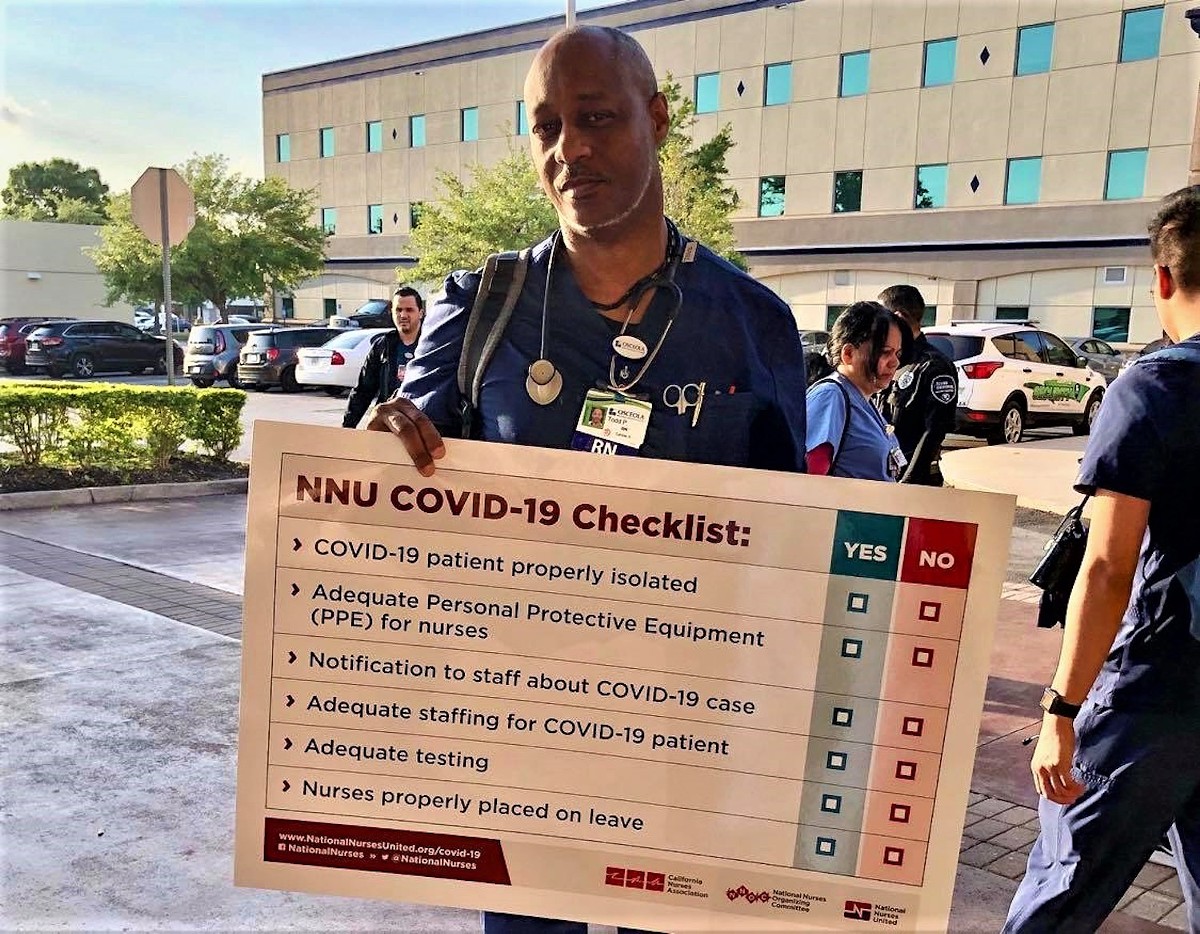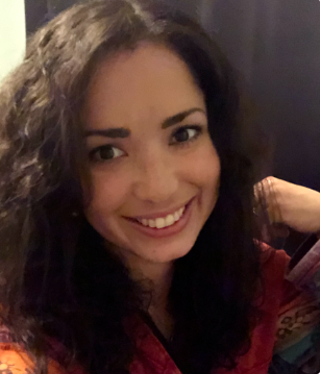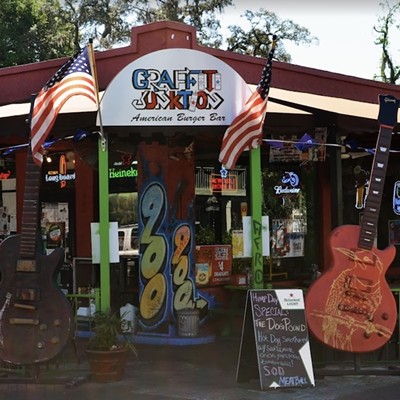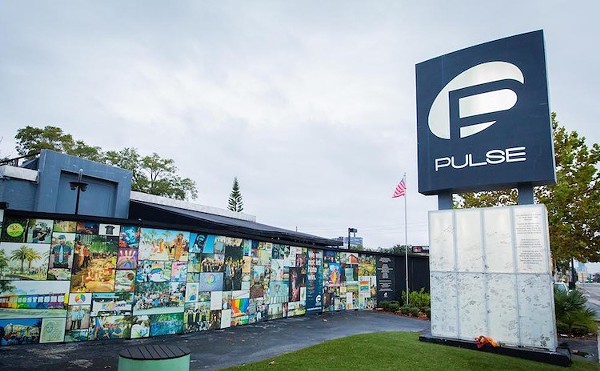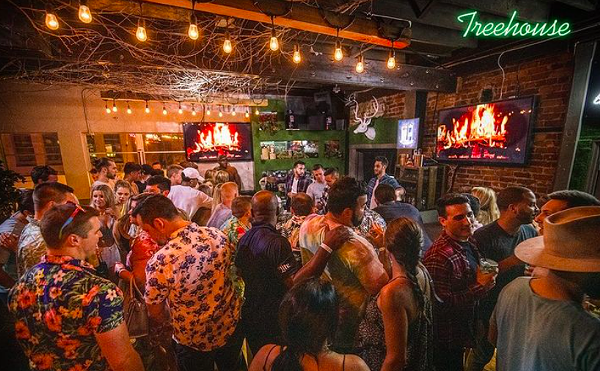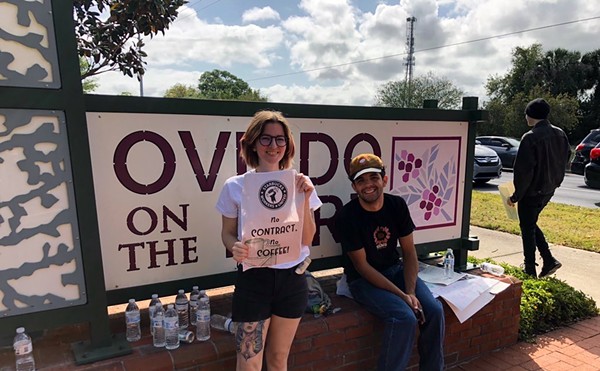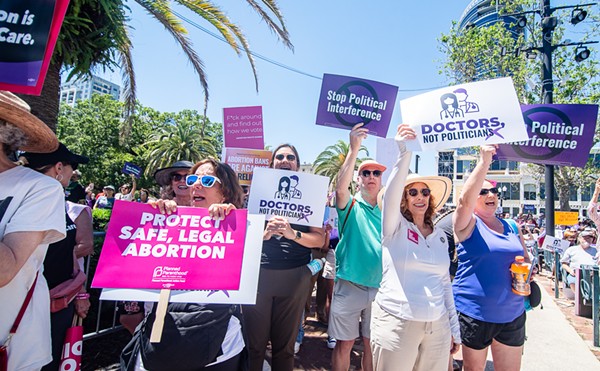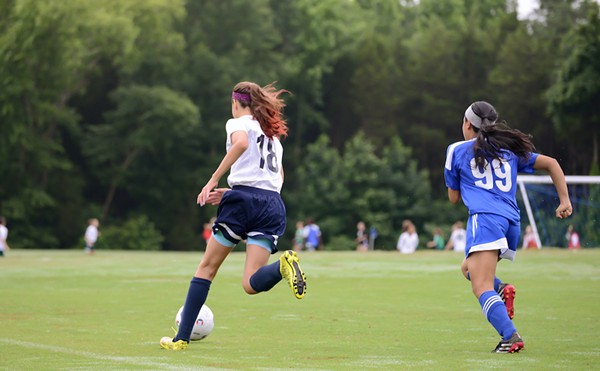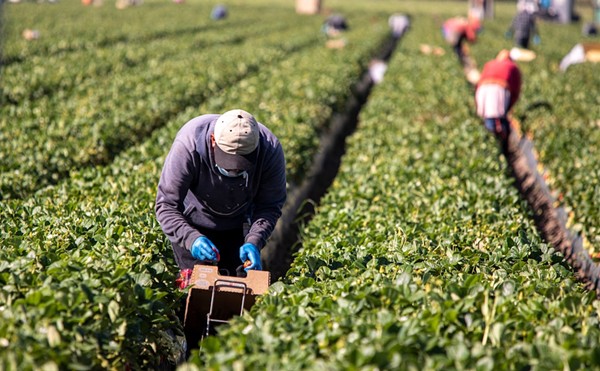Security, stability and permanence are fragile constructs at the best of times, but in this grave new world we all find ourselves in, well, they've all but shattered.
Ever since Central Florida started feeling the effects of COVID-19, Marissa Lee's work day has changed significantly.
The labor and delivery nurse says the first thing she does is find the hand sanitizer as soon as she gets in the building. The second thing she does is put on a surgical mask.
She then goes about her business at the Osceola Regional Medical Center in the new world of COVID-19, explaining to each of her patients why she's wearing a mask and carefully assessing health threats.
Lee is doing her best to keep everyone as safe as she can. There's only one problem: Surgical masks don't protect against the infection.
Yet Lee says that ORMC medical staff is lucky if they even get that, as N95 masks and other necessary personal protective equipment are being locked away, denied and harshly regulated.
"We don't have the proper equipment to protect ourselves," Lee says. "We're the ones out there on the front lines of this. I should be able to determine if I need an N95 mask or any equipment, not someone sitting in an office."
Lee and the staff at ORMC are not alone. As the global battle against the new coronavirus continues to intensify, the American healthcare system is becoming overwhelmed with a demand for adequate medical care. The sudden spike in patient numbers and the urgency of their conditions have left hospitals across the U.S. depleted of resources and medical staff basically begging for provisions.
Outraged at the neglect from hospital owners, management and authorities, National Nurses United, the largest workers union for registered nurses in the country, organized to protest "a lack of preparedness" that they say "places nurses, other staff, and patients at risk" during this pandemic. The protests took place last week in 15 different medical facilities spanning several states.
"Nurses at various HCA hospitals are reporting that they have had to work without proper protective equipment," said a National Nurses United press release released last Wednesday. "They are told to unsafely reuse masks, and at one hospital they are even being told not to wear masks because it 'scared the patients.'"
Update, April 8 | An HCA spokesperson reached out to Orlando Weekly to say: "HCA Healthcare’s hospitals in Central Florida are doing everything they can to equip their patient care teams to provide safe, effective care to the people we serve, unwavering in our dedication despite the unique challenges presented by COVID-19. The National Nurses Union is trying to use this crisis to advance its own interest – organizing more members." Their full statement is at the bottom of this story.
HCA stands for Hospital Corporation of America, recently renamed HCA Healthcare – a Fortune 500 company with a recorded revenue of $46.6 billion in 2018, and also the company formerly led by Florida Sen. Rick Scott. You may remember HCA for committing the largest Medicare fraud in U.S. history under Scott's watch.
According to the NNU press release, "the wealthiest hospital corporation in the United States" should be able to meet such minimal demands, and failing that, should be held accountable for its "disgraceful and unconscionable" disregard for worker and patient safety.
The protesters held signs bearing a checklist of specific items nurses need to properly attend patients sick with COVID-19. They used the opportunity to educate other nurses about their entitlements as workers.
Lee says the protests were kept small on purpose. Though she had an overwhelming response from nurses who wanted to participate, in adherence with social distancing, she only accepted just three to four nurses at a time.
At the Central Florida Regional Hospital in Sanford, Louella Ellis, an ICU nurse, was a supporter of the protests as well. She says she is dedicated to her job but has her family to think about.
“I was insulted,” Lee says of Trump’s suggestion that nurses were stealing masks. “It was a smack in the face. I couldn’t believe he said that.”
tweet this
"I'm afraid as a nurse that I may get infected then bring it to my grandchildren," Ellis says. "So, I come home and isolate from my family."
Ellis says that medical staff deserves to be prioritized over profit at a time like this, and that the hospital has an obligation to keep her safe while she works.
"I want the hospital to respond with the highest level of protection that I can have," Ellis says. "I think we deserve a lot of attention and assistance from government. We deserve management and the CDC to give straight answers."
Ellis refers to a confusing flow of information they've received, something Lee also mentions. They both say they were first told not to wear masks at all. Then, they were told they could wear masks but had to provide their own. After that, they were told they couldn't wear their own masks anymore. Now they're being told they can wear "face bandanas."
"There is no science behind that," Ellis says. "Who's saying this? Who's making these decisions?" She says she believes the treatment of medical staff throughout this crisis has been insulting from all ends. She fears the U.S. will find itself with a shortage of its most essential workers if they become tired of the abuse.
"They are sacrificing us for cost because they didn't prepare," Ellis says. "And we're sitting here looking at the President saying that we're stealing masks – you're going to have a lot of nurses who are going to leave the profession rather than do this job. And you're going to run out of that precious commodity of nurses and doctors to take care of patients."
Last week, President Donald Trump made public statements about N95 masks "going out the back door" of hospitals, suggesting that nurses were stealing supplies they need to work.
"I was insulted," Lee says when asked about the remarks. "It was a smack in the face. I was so angry and couldn't believe he said that."
Trump's suggestion falls short on validity when placed against the intense criticism and persistent clamors for aid coming from the American medical field at large.
The American Hospital Association, American Medical Association and the American Nurses Association collectively signed and published a letter to the President as early as March 21, asking that he use the Defense Production Act to "increase the domestic production of medical supplies and equipment" for hospitals.
Criticism has even come from within the administration. In a House committee hearing on COVID-19 test kits, director of the National Institute of Allergy and Infectious Diseases Anthony Fauci declared that America "is not really geared to what we need right now" to be prepared for this pandemic."That is a failing," he said. "Let's admit it."
Rep. Anna Eskamani of Florida's District 47 says the COVID-19 pandemic has dramatically increased her to-do list and that the No. 1 issue right now is managing the health crisis.
"We're trying to get more testing, we're trying to get more PPE," Eskamani says. "It's awful, and it shouldn't even be a question. How does the richest country in the world not have PPE?"
Eskamani says she subscribes to the idea that the economic crisis should not be addressed before the public health crisis. However, Lee says therein lies the root of the problem.
"In America, you have to buy into the healthcare system," Lee says. "It's not about the patients or the nurses. It's all about making money."
In the meantime, while the healthcare industry brings in a GDP of trillions every year, nurses are having to fashion their own medical protection gear with unsuitable items.
From wrapping double gowns around themselves to cover their entire bodies, to wearing surgical caps on their shoes – a simple Google search will yield plenty of photographs and articles showcasing the tragicomedy these nurses are living. Some even use visors as face shields, tape to seal their gloves, or trash bags to cover breathable nylon gear.
"If we get sick, no one is safe," Ellis says. "So, you get very creative."
One of Lee's co-workers just tested positive for coronavirus. The 28-year-old, whose identity she kept to herself, went on to infect his partner and their roommate. Lee says she wonders how many patients he could have potentially infected while treating them, as he was not told to stay home while awaiting his results.
"And it could have all been prevented with the correct mask," Lee says. "This is evidence that the surgical mask does not protect at all, and that's what we're using, surgical masks."
Lee is immune-suppressed, with diabetes and high blood pressure. At her age (63), she could use that as a reason to stay home. She says she thinks of the extra workload on her co-workers, however, and of how it would impact the quality of care for the patients. So she decides to make that 45-minute drive to the hospital every shift, to sanitize and put on a useless surgical mask that she knows won't keep her safe.
"You know why I go to work? Because I made an oath to take care of my patients and do the best I can," she says. "I have to think about my patients first, me second. This is a sad way to think but, as a nurse, I feel that I'm invincible, and I have to go to work and take care of those patients that are ill."
With a hint of faith in something greater, Lee says she is not afraid of becoming infected. What does concern her is what may be yet to come.
"I don't mean to get religious, but I wouldn't say that I'm scared [to get sick]," Lee says. "I'm scared that this disease hasn't really kicked in yet in Florida. Give it another four weeks. It will peak, and it will be horrible. I think it's going to be worse than New York, to tell you the truth."
Sounding this alarm, Lee insists on leaving only one message behind:
"People, stay home," she says. "Please, please, stay home, and stay safe."
Update, April 8 | Following publication, a spokesperson for HCA reached out with this statement:
“HCA Healthcare’s hospitals in Central Florida are doing everything they can to equip their patient care teams to provide safe, effective care to the people we serve, unwavering in our dedication despite the unique challenges presented by COVID-19. The National Nurses Union is trying to use this crisis to advance its own interest—organizing more members.
Since the onset of the COVID-19 pandemic, our goal has been to protect our frontline clinicians and caregivers so they are able to continue to care for our patients and community. The pandemic has strained the worldwide supply of personal protective equipment (PPE), including masks, face shields, and gowns, a challenge that is not unique to our hospitals or any other hospital or health system in the United States. While our HCA Healthcare hospitals are doing everything in our power to secure additional supplies, and we are following CDC protocols for using and conserving PPE, the worldwide shortage is a reality that we are addressing with realistic, workable solutions. The steps we have taken include:
· Enacting universal masking for all of our employees
· Appointing a PPE Steward to oversee priority deployment of PPE effective for COVID-19 where and when it is needed most
· Creating strategically located PPE distribution centers across our campus to quickly deliver equipment
We also have taken steps to help protect the financial security of our front-line caregivers and their support colleagues, including a “pandemic pay continuation” policy even as other health care systems have announced layoffs. For colleagues with reduced hours, the company will seek to redeploy them to other opportunities so they can continue working. Those who cannot be redeployed will continue to receive 70 percent of base pay for up to seven weeks. For colleagues working in patient care facilities who are quarantined per CDC guidelines, we will pay 100 percent of base pay for scheduled hours regardless of where the exposure took place.
In addition, we will offer scrub laundering for colleagues who care for COVID-19 patients. In addition, we are working with major hotel chains to provide housing for caregivers who provide care to COVID-19 patients and prefer not to go home to their loved ones after their shift. The COVID-19 pandemic is unique, and our colleagues’ concerns are real. In this unparalleled crisis, everyone should stand together to support our nurses, and not spread misinformation and fear to advance other agendas.”
— This story appears in the April 8, 2020, print edition of Orlando Weekly. Our small but mighty team is working tirelessly to bring you news on how coronavirus is affecting Central Florida. Please consider supporting this free publication with a one-time or monthly donation. Every little bit helps.

